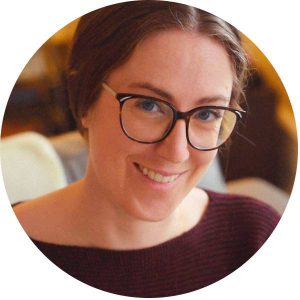
Amy Griffith, Toronto, Ontario, Canada
I’ve told my story many times before. Every time I am asked to tell it, I always ask myself: “why would anyone want to hear it again?”. But overtime, I’ve realized it’s because my story is not unique. At one point I assumed my story was different, that nobody could ever have gone through what I did. I came to realize that this was not the case. That my story was lived by many women within my community, and we had more similarities than we did differences. The only difference I could see, was that we did not share our stories with one another.
Von Willebrands disease is known to be an inherited disorder. This means that it is something to be expected, screened for, that is already living within someone’s family, and the likelihood of being passed down is assessed and discussed before a child is born. This, however, was not the case with me. I was born to two non-affected parents, as an only child in a country were where we were separated from the rest of our family, my parents’ main support system. It wasn’t until I was around four years old that my parents started to notice that something might be different, that their child covered in bruises and having frequent, hours long nosebleeds may not be normal, or due to the fact that I’ve always been very uncoordinated and clumsy. It wasn’t until Children’s Services were involved, by undoubtedly well meaning people, that my family knew some thing needed to happen, that this was more urgent than they realized.
My family was incredibly fortunate to have a family connection in the medical system, this is the only reason my diagnosis of Von Willebrands Disease, Type 2A, happened as early as it did. I realize now that is not the case for many women, and that they often do not get diagnosed until they have life altering, medically dangerous bleeds. I now realize that much behind the late diagnosis of women has to do with the way we recognize inherited bleeding disorders and their male dominated history.
Growing up with a bleeding disorder at times was not easy. Like many children, my top priority was just blending in, being a normal kid, and not being noticed for my differences. This often meant I was not interested in wearing my incredibly important MedicAlert bracelet, something that I advocate very strongly for now, and ensuring that I was always able to keep up with my peers. It wasn’t until my early 20s that I realized the best way to help people understand what I lived through, was to invite them in and educate them. It’s because of my willingness to do this that now that I have such a strong, understanding support system around me.
Like many women, my biggest bleeding concern and as it turns out, threat to my health, was my period. Many women with bleeding disorders suffer in silence through this biologically normal and healthy part of their lives. Menstruation is a taboo subject, and not something many people are comfortable talking about, even within their own families. This culture of silence is what perpetuates the many issues women face, including anemia, which contributes to a rapid decrease in lifestyle and wellness. For me, I didn’t have an understanding of what a healthy period should look and feel like. Although I had a wonderful relationship with my family, it was not something I felt comfortable talking about based on the reactions of others around me. As a result, I continued to lose too much blood on a regular basis. My hemoglobin and iron levels plummeted to a dangerous level, a level that affected my everyday life, enjoyment of activities and time with friends, and made everyday a challenge just to get out of bed. It wasn’t until I started on a regular iron and bleeding treatment plan that I realized how much I was trying to normalize feeling awful every day for the sake of my period. This realization took three years.
At first I was angry. I was angry that when it came it my period, even though I knew exactly when my bleed was going to happen, how much blood I was going to lose, and long the bleed would last, that it was considered acceptable that I would have to advocate for a treatment plan, whereas some of my male friends with inherited bleeding disorders did not. However overtime, I connected with a women’s speciality clinic in Toronto, and all the pieces of my care finally fell into place. I’m happy to say that this clinic is now one of three currently operating in Ontario.
My work with Heroixx and Hemophilia Ontario today is a personal mission. I made a promise to myself a long time ago then no woman or young girl should ever feel that they do not have a space in our bleeding disorder community. That their care, treatment, and overall sense of belonging should never be sacrificed because of their gender or diagnosis. I’m proud to be a cofounder of this website, and I’m so happy that you are here reading this story.









